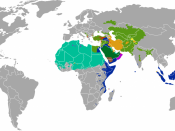Introduction to Economics
The salient features of Islamic economics and contrast them with those of conventional economics?
Introduction
Islamic economics is based on the Shariah which governs secular as well as religious activities. The basic objectives are to ensure general human well-being and socio-economic justice. Islam advice Muslims to enjoy the bounties provided by Allah and to set quantitative limits to the extent of material growth of Muslim society. Islam also advices Muslims to gain mastery over nature since according to the text all the resources have been created for the service of mankind.
In the concept of Islam everything in this universe belongs to Allah and He is the real owner of everything. Human beings trustee and he is accountable of its use. If the property holder dies then the property will inherit to the parents and relatives according to the Shariah guideline. However in conventional economics human beings claim the absolute ownership of the wealth and he enjoys it on his determination.
Individuals play a vital role in Islamic economics. In Islam man is charged with certain obligation toward Allah, nature, himself and other human beings. Shariah has outlined the guideline to fulfill these obligations, certain rights ad freedoms. Limitations which are imposed by the Shariah on the rights and freedom of the individual are in the direction or removing certain negative impact to the human life. Islam has given a great emphasis to look after their family and it is obligation. Islam discourages to waste money and encouraging to earn extra to help others as charity. Conventional too has the similar concept but main objective is self interest and profit maximization. Hence they sometimes ignore the social factor in their trading. In fact, Islam exhorts its believers to excel in this life as well as in...


